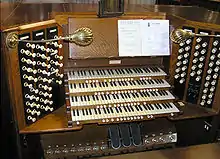organ
English

Etymology
From Middle English organe, from Old French organe, from Latin organum, from Ancient Greek ὄργανον (órganon, “an instrument, implement, tool, also an organ of sense or apprehension, an organ of the body, also a musical instrument, an organ”), from Proto-Indo-European *werǵ-.
Pronunciation
- (General American) IPA(key): /ˈɔɹ.ɡən/
- (Received Pronunciation) IPA(key): /ˈɔː.ɡən/
Audio (US) (file) - Rhymes: -ɔː(ɹ)ɡən
- Hyphenation: or‧gan
Noun
organ (plural organs)
- A larger part of an organism, composed of tissues that perform similar functions.
- (by extension) A body of an organization dedicated to the performing of certain functions.
- (music) A musical instrument that has multiple pipes which play when a key is pressed (the pipe organ), or an electronic instrument designed to replicate such.
- 1918, W. B. Maxwell, chapter 5, in The Mirror and the Lamp:
- He was thinking; but the glory of the song, the swell from the great organ, the clustered lights, […], the height and vastness of this noble fane, its antiquity and its strength—all these things seemed to have their part as causes of the thrilling emotion that accompanied his thoughts.
-
- An official magazine, newsletter, or similar publication of an organization.
- A species of cactus (Stenocereus thurberi).
- (slang) The penis.
Hyponyms
- See also Thesaurus:organ
Derived terms
Translations
|
|
|
|
|
|
Further reading
- organ in Webster’s Revised Unabridged Dictionary, G. & C. Merriam, 1913.
- organ in The Century Dictionary, New York, N.Y.: The Century Co., 1911.
Middle English
References
- “organ(e (n.)” in MED Online, Ann Arbor, Mich.: University of Michigan, 2007, retrieved 2018-04-02.
Norwegian Bokmål
Etymology
From Latin organum, a borrowing from Ancient Greek ὄργανον (órganon),
Noun
organ n (definite singular organet, indefinite plural organ or organer, definite plural organa or organene)
Derived terms
See also
- orgel (musical instrument)
Norwegian Nynorsk
Etymology
From Ancient Greek ὄργανον (órganon), via Latin organum
Derived terms
See also
- orgel (musical instrument)
Polish
Pronunciation
- IPA(key): /ˈɔr.ɡan/
Audio (file)
Noun
organ m inan
Romanian
Etymology
From Byzantine Greek ὄργανος (órganos), from Ancient Greek ὄργανον (órganon), partly through the intermediate of Slavic oruganu. Some senses also based on French orgue (cf. orgă), Italian organum, Italian organo.
Declension
Synonyms
- (musical instrument): orgă
Serbo-Croatian
Pronunciation
- IPA(key): /ǒrɡaːn/
- Hyphenation: or‧gan
Swedish
Pronunciation
Audio (file)
Noun
organ n
- (anatomy) an organ (a part of the body)
- (dated) a voice (of a singer or actor)
- Hon förenade med ett utmärkt teateryttre en hög grad af intelligens, en ypperlig organ och en förträfflig deklamationskonst
- She combined with excellent theatrical looks a high degree of intelligence, an extraordinary voice and a splendid mastery of declamation
- Hon förenade med ett utmärkt teateryttre en hög grad af intelligens, en ypperlig organ och en förträfflig deklamationskonst
- an organ; a newspaper (of an organization, i.e. its voice)
Declension
| Declension of organ | ||||
|---|---|---|---|---|
| Singular | Plural | |||
| Indefinite | Definite | Indefinite | Definite | |
| Nominative | organ | organet | organ | organen |
| Genitive | organs | organets | organs | organens |
Related terms
- föreningsorgan
- nyhetsorgan
- organdonation
- partiorgan